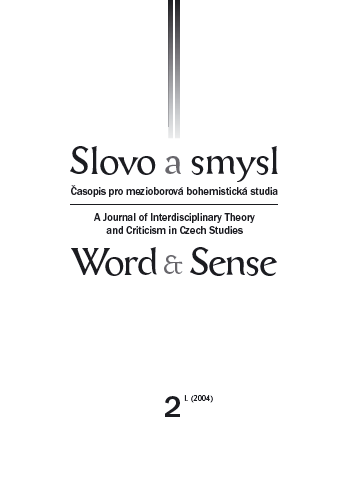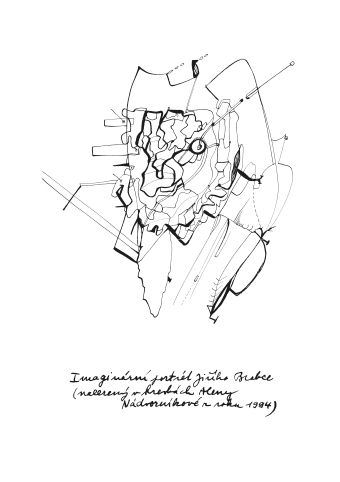Grandmother dissected
1.
The carriage jolted to a halt at Staré Bělidlo. Grandmother, knocked around by the ride, wobbles out to hug Tereza.
Mr. Prošek tries to speak Czech.
The grandchildren assault grandmother’s coat pockets: a marzipan doll and gingerbread horses. The lambkins munch, chomp at their treats. Once while grandmother was pitting little Adéla to sleep at the piano and faithful May kittens were clawing at one of the large dogs in the courtyard, the grandchildren pried open her decorated wood chest with a crucifix.
Mrs. Prošek admonished the children: When grandmother dies it will all be yours anyway.
2.
White stars, as if the clouds were having a snowball fight. Whiter than white cabbage or whitefish, whiter than the whites of the women’s eyes in Staré Bělidlo. Jan is thinking about Viktoria.
Grandmother, what does crazy mean?
The old lady thought of a cruel comparison: Viktoria is an endive.
Jan burst into tears and started walking slowly toward the weir to catch the weakened voice of a sad fish, to chase away the weakened voice of a little fish, to fish from a scale its weakened voice.
Viktoria fled the weeping man.
Crazy means to sing sadly for a long time, until the moon and the weir trade places, so that the mill moves to the heavens and skittle players hold a great celebration of thanks; crazy means dancing on the floes of one’s eyes in a river of tears, climbing the white ladder of one’s teeth to reach the highest laugh, rubbing one’s eyes and still seeing only an upside-down forest and erupting fountains; crazy means running, laughing and singing, because footpaths go on forever, for thunder also mocks lightning, and the weir is an orchestra.
3.
The happy miller has come to give Adéla tongue-twisters. Peter picked a peck of pickled is the most gabled of all. Say it ten times fast.
Little Adélka with her twisted tongue hides behind grandmother’s skirt.
Grandmother sends her greetings to the miller’s wife.
Father makes a face and leaves.
Adéla calls out after him: Peter picked a peck of pickled mills on the lake, I don’t give a damn about any of the millers in them.
4.
Whenever the children went to visit the mill, Mančinka brought them to the old mill wheel, where they played sorrowful games amid the mold and cobwebs. They danced wildly under a long cobweb that Vilém lengthened with white thread, so that a moment later they stood for a long, long time without moving until Barunka said the secret word, or Jan frightened them with hands full of spiders.
After which Barunka, swooning by now from the smell of rotting wood, begins to sing with Viktoria’s voice.
Jan begins to fondle and kiss her in a un-brotherly way.
In the short pauses in her singing, as Barunka catches her beautifully quickened breath, grandmother’s voice can be heard faintly telling stories of the Emperor Joseph.
5.
The hunter has lit his green pipe and is blowing smoke into the barrel-organ. The hunter’s wife observed that grandmother likes currant jelly.
No one failed to notice the bleating of the tamed deer being pestered by the children in the courtyard.
Now the hunter begins to tell about sad Viktoria.
6.
Her beauty was blasphemous, for it did not in the least match the pictures of saints great or small.
Night after night she hid night in her hair, along with the gorgeous, hypnotizing eyes of a soldier who circled her home from sundown to sunup, trying to keep step with the moon.
One rainy night she went out and spread her hair over him. He caught her by the legs and raised a living umbrella over him.
They walked like that all night, until the morning light showed them the fountain in whose glassy surface they saw a soldier sleeping with an umbrella and a seven-color rainbow wearing a mourning ribbon.
Then they drank the fountain dry and carved hearts in all the forest trees that looked more like umbrellas.
The threes groaned fearfully under their auger-like fingernails.
Viktoria began to sing.
The soldier modeled her voice out of sticky sap. The work recalled a speechless infant. They parted afterwards, having arranged a meeting. At the weir in an eternity.
By then the soldier will have exchanged his umbrella for a rifle, by then Viktoria may even have finished counting all the carved hearts, all the lamenting throats an all her fingers, which may finally stop swaying and reaching up somewhere, as if hurriedly moving the hands on a clock that hangs high on the wall in some faraway cottage living room.
7.
The wet smoothness of staircases, the flash of balustrades and the thunder of servants’ heels. Grandmothers’s simplicity is a rosary against this storm of luxury.
In a while comes the sunny smile of the princess and many reasons to be curious, to be flattered, to laugh and remember.
The princess and her echo train their ears on sayings.
Presents get passed around.
Afterwards people take their leave.
To the frightened servants it seems that a haywagon is making its way through the chateau.
The princess goes to the window, to see grandmother scolding the grandchildren who are playing catch with apples they received from the sad Countess.
Oh happy apples!
8.
Corpus Christi processioneres make their way through the decorated village streets. Nobility, notables, commoners. The old lady loves these rituals. They haven’t changed since her girlhood years. She sees her youth buried deep under the white layer of Corpus Christi flowers. Two young acolytes are pushing each other up front. The smoke from swinging censers surrounds her. And she, accompanying the return procession for a while, turns the pages in her prayer book with beautiful pink hands.
9.
It’s Mr. Prošek saint’s day.
10.
It’s the Virgin Mary’s saint’s day.
11.
The days are here when a deferential wind doffs the trees of their cap of leaves.
Grandmother seems to the children to have deeper wrinkles; when she chats at the weir, raising her arms every once in a while, it’s as if she was soothing the wind: Leaves. They fall as soon as they are able to mimic the colors of the sun. What terror after joy.
The miller walks around absent-mindedly mumbling to himself: “A countryside with jaundice.”
Jan and Vilém swallow the fog in gasps.
Barunka sticks her sentimental neck into the noose of Indian summer. Leaves fall slowly on her outstretched tongue.
12.
Christmas peace in Staré Bělidlo was interrupted by but one incident. On Christmas Eve, Grandmother set loose both the big dogs, Sultán and Tyrl, on Kudrna’s kids, who were singing frightful carols below the windows:
Since ancient times the star falls in the bower
Never never in the manger
No saints ever get born
There’s no Bethlehem
13.
The Christmas trees withered as soon as the sky turned blue. The children caught all kinds of coughs.
Barunka stands on a small hill not yet covered by the swollen river. She thinks: an incredible solstice is setting in. Nature parades, the shout of flowers, battalions of trees, banners tall and still taller, infinitely tall, all in honor of the sun, the gorgeous viper stung my eyes with light!
And the river continues to overflow its banks, flooding meadows, fields and forests, just as love spills over into one’s eyes, hands, mouth and voice after filling up one’s hearth.
14.
Fifteenth and sixteenth chapters.
17.
The predatory black clouds hid for a long time beyond the forest before they strangled the sun, said the hunter, everything was all pale until now. Then the land turned quickly into an enormous hop-field of rain.
Swordsman-like blows of lightning and the thunderous sound of blades of grass filled such an otherwise peaceable landscape, wrote the beautiful princess in her diary. The duel was so ravishing that I began slowly to undress before the open window.
Viktoria trustingly bared her shoulder and got inoculated by lightning, Barunka tried to comfort the inconsolable Jan.
18.
Grandmother was laid to rest in a coffin together with Viktoria at her request.
The funeral procession tears out of people’s eyes like juice from a lemon.
The wind raised dust, blinding the roadway and the horses. The procession wandered all day over roads that by evening had been thoroughly muddied with tears.
The princess stood at the windowsill and whispered: Un jour mon prince viendra.
Translated by Matthew S. Witkovsky


